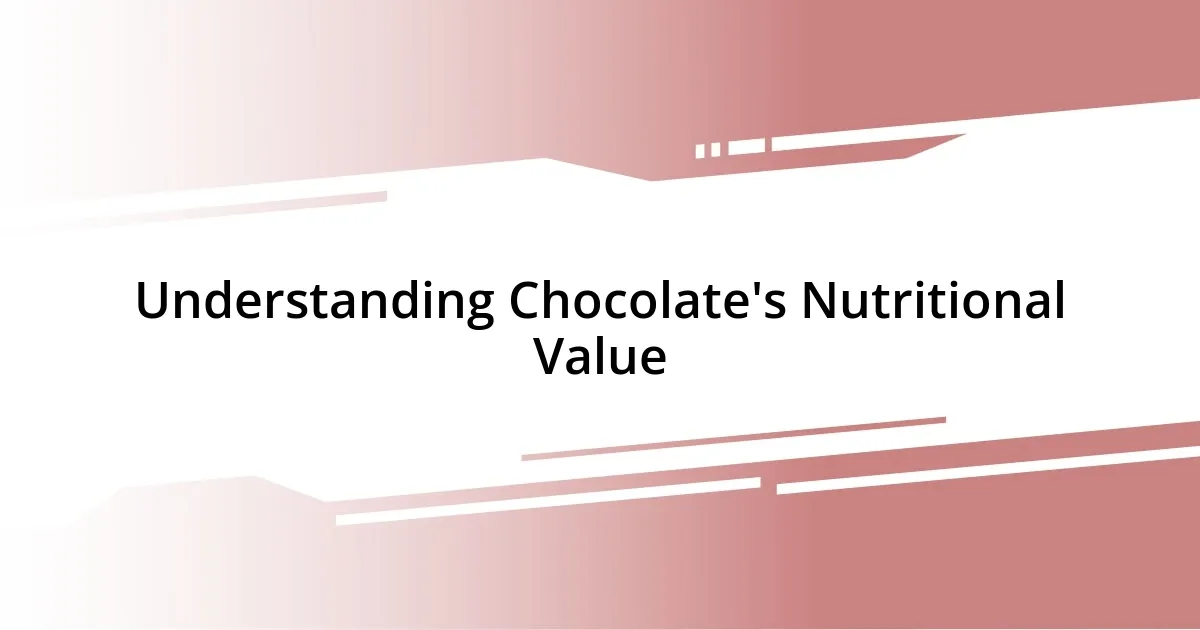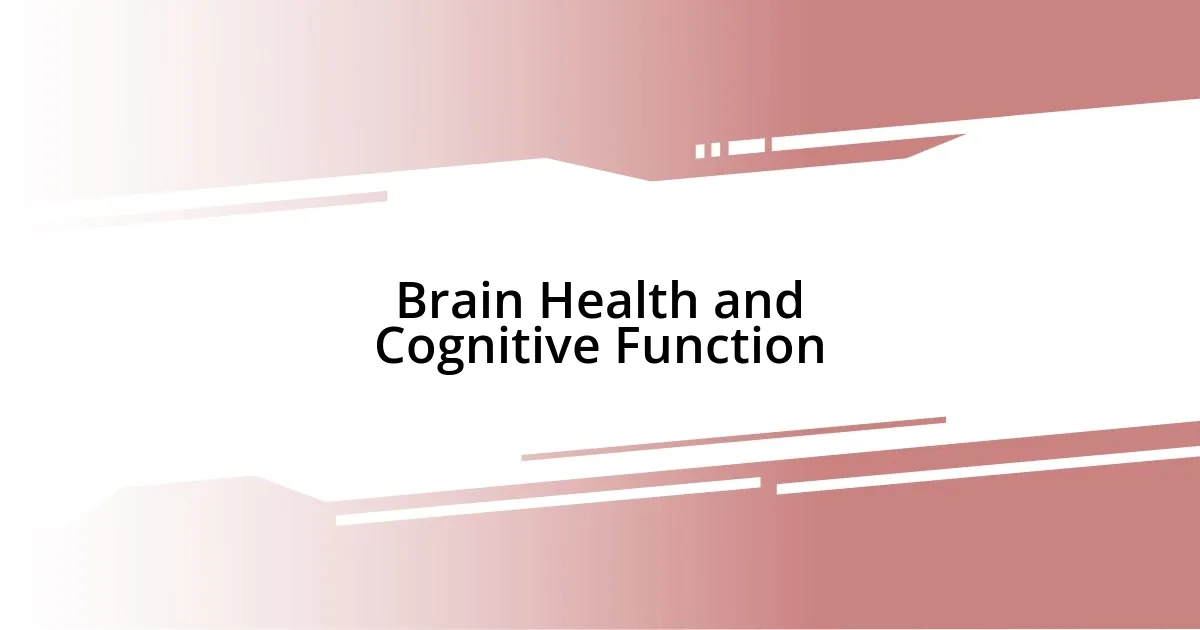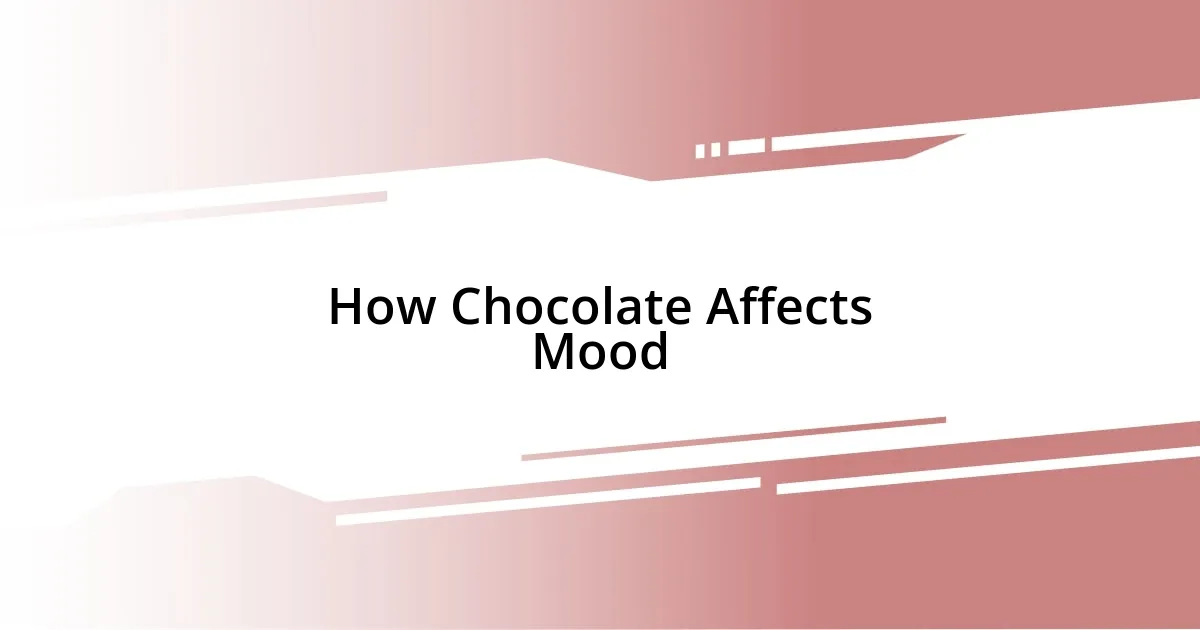Key takeaways:
- Dark chocolate contains flavonoids, which can improve brain function and circulation while also providing essential nutrients like magnesium and iron.
- Moderate chocolate consumption can enhance mood and cognitive performance, but excessive intake may lead to sugar crashes and negative health effects.
- Incorporating chocolate into meals or as a reward can boost productivity and motivation, while also enjoying its cognitive benefits.

Understanding Chocolate’s Nutritional Value
When I think about chocolate, I’m always amazed by its complexity. Did you know that dark chocolate is packed with flavonoids? These antioxidants can potentially improve brain function and circulation. It’s like a little boost of joy wrapped in a delicious bar!
On a personal note, whenever I indulge in a piece of rich, dark chocolate, I can almost feel my stress dissolve. It’s fascinating how it can also contain essential minerals like magnesium and iron. Isn’t it remarkable that something so delightful could be providing our bodies with necessary nutrients?
Chocolate’s nutritional value varies greatly depending on its type; for instance, milk chocolate has a higher sugar content and less cocoa than dark chocolate. This difference can impact not just the flavor but the health benefits as well. So, next time you reach for that chocolate treat, I encourage you to consider its type and the potential benefits it could bring. What’s your go-to chocolate choice?

Brain Health and Cognitive Function
Understanding the connection between brain health and cognitive function can be fascinating. I’ve often noticed that after enjoying a small piece of dark chocolate, my mind feels sharper and more focused. Flavonoids, the compounds found in chocolate, can enhance blood flow to the brain, potentially improving our memory and overall cognitive abilities.
Here are some key points to consider regarding brain health and cognitive function:
- Antioxidant Properties: Flavonoids in dark chocolate can help combat oxidative stress, which is linked to cognitive decline.
- Improved Mood: Chocolate can stimulate endorphin production, enhancing mood and relieving stress, which is essential for cognitive function.
- Memory Boost: Research suggests that the consumption of chocolate may help improve both working memory and overall cognitive performance.
- Neuroprotective Effects: Certain compounds in chocolate may have protective effects on brain cells, potentially lowering the risk of neurodegenerative diseases.
I personally find that those moments when I savor chocolate are also when I take a break to reflect. It’s those brief pauses that seem to recharge my brain, making me feel more alert and ready to tackle the challenges ahead. Whether I’m face deep in work or just enjoying a lazy afternoon, chocolate often becomes my companion in enhancing both my mood and mental clarity.

How Chocolate Affects Mood
When I indulge in chocolate, I often notice an immediate lift in my mood. It’s not just me; studies show that the sugar and fat content can trigger the release of feel-good hormones, like serotonin. This is particularly evident when I enjoy a chocolate treat during a tough day—it’s like a warm hug for my brain.
Moreover, I find that dark chocolate in particular has a unique ability to calm my nerves. The compounds in chocolate can reduce stress hormones, creating a soothing effect. I remember a stressful afternoon filled with deadlines; a piece of dark chocolate helped me take a moment to breathe and refocus. It’s amazing how a simple delight can transform my mental state.
Chocolate’s impact on mood varies depending on the type and quantity consumed. While a small piece might elevate spirits, overindulgence could lead to a sugar crash. I’ve learned to savor chocolate in moderation, truly enjoying each bite, which keeps me feeling uplifted rather than weighed down.
| Chocolate Type | Mood Effect |
|---|---|
| Dark Chocolate | Enhances mood and reduces stress |
| Milk Chocolate | Provides a quick energy boost but may lead to a crash |

Incorporating Chocolate into Your Diet
Incorporating chocolate into your daily diet can be both delightful and strategic. I often add a few dark chocolate squares to my morning routine by pairing them with my breakfast, like oatmeal or yogurt. It’s fascinating how such a small addition can immediately elevate the meal’s satisfaction while also providing a cognitive boost to tackle the day ahead.
Have you ever tried incorporating cocoa powder into your smoothies? I experimented with this a few weeks ago and was pleasantly surprised at how it transformed my morning shakes. Not only did it enhance the flavor, but I felt that familiar clarity wash over me as I downed my breakfast. Plus, blending it in with fruits makes it a guilt-free treat!
Another approach I love is using chocolate as a reward while studying or working. When I finish a task, I treat myself to a piece of chocolate. It becomes a motivation tool for me. The joy of that little indulgence makes me more productive and reinforces a positive connection between effort and reward. Have you tried setting a similar system for yourself? You might find it incredibly effective!

Potential Risks of Excessive Consumption
Excessive consumption of chocolate might seem like an indulgence that brings joy, but it can lead to some unwelcome consequences. Personally, I’ve experienced the aftermath of overindulging in chocolate—the sugar highs followed by crashing lows left me feeling drained and irritable. It’s a bit ironic, isn’t it? What starts as a sweet moment of happiness can turn into a struggle to regain focus and energy.
I’ve also noticed that too much chocolate, especially the sugary varieties, can contribute to unwanted weight gain. There was a phase when I enjoyed chocolate bars daily with zero restraint. After a while, my jeans felt tighter, and that’s when reality hit me. It’s essential to enjoy chocolate, but keeping an eye on portion sizes helps prevent the grim reality of a chocolate-induced regret.
Additionally, I’ve found that excessive chocolate consumption can impact my skin. There was a time when I munched on chocolate repeatedly, thinking it was harmless. Surprise, surprise—I noticed breakouts and dullness that made me rethink my choices. A little moderation, paired with mindful enjoyment, keeps the skin clear and the brain happy. Have you ever had a similar experience? Balancing indulgence and health is the key.

Research Findings on Chocolate Benefits
Research studies have consistently highlighted chocolate, particularly dark chocolate, as a powerful ally for brain health. For instance, I’ve come across findings suggesting that the flavonoids in dark chocolate can enhance cognitive function by improving blood flow to the brain. It’s pretty exciting to think that something so delicious can also give our brains a boost, right?
Furthermore, I remember reading about a study where participants who consumed dark chocolate showed improved memory and attention skills compared to those who didn’t. This finding resonated with me—I often feel more focused after enjoying a few squares during a challenging work session. Have you noticed a similar effect when you indulge?
Interestingly, many people overlook the emotional benefits of chocolate. Research has shown that chocolate can stimulate the production of endorphins, which can elevate mood and reduce stress. I’ve certainly felt this—a piece of chocolate at the end of a long day can turn my mood around. Have you ever found comfort in a sweet treat? It’s fascinating how something so simple can have such profound effects on our mental well-being.













